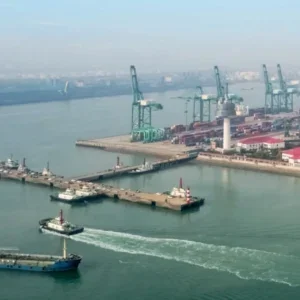“With these enhancements, the Port Optimizer will now provide visibility for 70% of the import data for the San Pedro Bay port complex,” said Gene Seroka, executive director, Port of Los Angeles. “Based on industry feedback, we have made additions that gives stakeholders more planning and performance capabilities.”
Through the partnership with Wabtec Corporation and GeoStamp, stakeholders now have a single view that offers real-time and historical truck turn times for all 12 container terminals in the San Pedro Bay port complex. For Port of Los Angeles container terminals, average dwell times for both trucks and on-dock rail are also available.
“The Port of Los Angeles is a pioneer in digitizing supply chain operations, continually increasing throughput and improving efficiency,” said Nalin Jain, president, Wabtec’s Digital Electronics business. “Port Optimizer’s enhancements will help port stakeholders optimize their operations, relieve congestion stemming from increased global shipping traffic, and get products to people faster.”
Developed in collaboration with Wabtec, the Port Optimizer is a dynamic cloud-based information portal that digitizes maritime shipping data for supply chain stakeholders. First introduced by the Port of Los Angeles in 2017, the digital platform has continually added new application features.
The Port Optimizer Control Tower is the primary dashboard to access all the new features. When logging into the Control Tower, users will find data including:
- Signal provides a daily look at cargo coming into Los Angeles, displaying projected volumes three weeks out.
- Horizon forecasts cargo movement up to six months in advance and gauges movement of containers, including imports, exports and empties.
- Volumes offer historical containerized volumes by terminal, shipping line and vessel, in addition to trending volumes by terminal, service and vessel.
- Turn Times offer real-time port-level views of San Pedro Bay truck turn times by terminal.
- Days After Discharge shows real-time totals of the number of containers discharged from vessels and currently on the terminal.
- Return Signal lets truckers know when and where to return empty containers to cargo terminals throughout the port complex.






